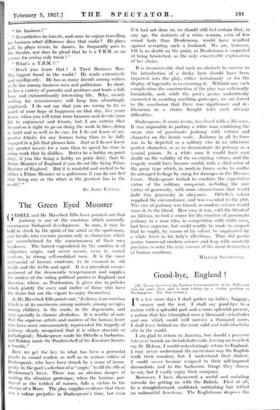The Green Eyed Monster
ESELL and Mr. Havelock Ellis have pointed out that kir jealousy is one of the emotions which naturally accompany biological development. In man, it may be held in cheek by the spirit of the artist or the sportsman, and breaks into envious passion only in characters which are overwhelmed by the consciousness of their own weakness. The hatred engendered by the emotion is of subjective origin, and never occurs, even in sexual matters, in strong self-confident men. It is the most anti-social of human emotions, to be excused in old maids and the feeble and aged. It is a prevalent accom- paniment of the democratic temperament and supplies the motive of the ruling political parties in England and America, where, as Puritanism, it gives rise to policies which gratify the envy and malice of those who have the desire _but not the vigour to enjoy themselves. ESELL and Mr. Havelock Ellis have pointed out that kir jealousy is one of the emotions which naturally accompany biological development. In man, it may be held in cheek by the spirit of the artist or the sportsman, and breaks into envious passion only in characters which are overwhelmed by the consciousness of their own weakness. The hatred engendered by the emotion is of subjective origin, and never occurs, even in sexual matters, in strong self-confident men. It is the most anti-social of human emotions, to be excused in old maids and the feeble and aged. It is a prevalent accom- paniment of the democratic temperament and supplies the motive of the ruling political parties in England and America, where, as Puritanism, it gives rise to policies which gratify the envy and malice of those who have the desire _but not the vigour to enjoy themselves.
As Mr. -Havelock Ellis points out, "Jealousy is an emotion which is at its maximum among animals, among savages, among children, in the senile, in the degenerate, and very specially in chronic alcoholics. It is worthy of note that the-supreme artists and masters of the human heart who have most consummately represented the tragedy of jealousy clearly recognized that it is either, atavistic or pathological ; Shakespeare made his Othello a barbarian, and Tolstoy made-the Pozdnischeff of his Kreutzer Sonata a lunatic." -- - Here we get the key to what has been a perennial Puzzle to casual readers as well as to serious critics of Shakespeare, who have been struck by a sense of incon- guilty in the poet's selection of a " negro to fill the role of Desdemona'S lover. There was an obvious danger of making the situation grotesque, when the -heroine, por- trayed as ,the noblest of women, falls im victim to the Charms of -a Moor. The play supplies evidence that there Was a colour prejudice in Shakespeare's time, but even if it had not done so, we should still feel certain that, in- any age, the instincts of a white woman, even of kss sound taste than Desdemona, would have revolted against accepting such a husband. We arc, however, left in no doubt on the point, as Dcsdemona is suspected of being bewitched, as the only conceivable explanation of her choice.
• It is inconceivable that such an obstacle to success as the introduction of a dusky hero should have been imported into the play, either fortuitously or for the display of ingenuity in overcoming it. Without any such complication the construction of the play was sufficiently formidable, and, while the poet's genius undoubtedly succeeded in avoiding anything grotesque, we are forced to the conclusion that there was significance and de- liberation in a choice fraught with such obvious Shakespeare, it seems to me, was faced with a dilemma. It was impossible to portray a white man combining the mean vice of passionate jealousy with virtues and character on the heroic scale. Jealousy ill all its force was to be depicted as a solitary vice ill an otherwise perfect character, so as to demonstrate its potency as a mental poison. In a white man it would have cast doubt on the validity of the co-existing virtues, and the tragedy would have become sordid, with a chief actor of the puny type which, in modern times, seeks to soothe its outraged feelings by suing for damages in the Divorce Court. Shakespeare wished to combine the superlative virtue of the military conqueror, including the rare virtue of generosity, with some circumstance that would hold this generosity in abeyance. Othello's colour supplied the circumstance, and was essential to the plot.. The vice of jealousy was traced, as modern science would trace it, to the blood. How easy it was, with the blood of an African, to find a source for the emotion of passionate jealousy in a man who, in competition with white men, had been supreme, but could readily be made to suspect that he might, by reason of his colour, be supplanted by a white lover in his lady's affections. Thus did poetic genius transcend modern science and leap with masterly precision to seize the very essence of the most destructive of human emotions.
WILLIAM SANDElisON.


























































 Previous page
Previous page